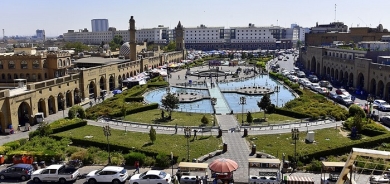Days after similar attack, suicide bombing rocks a Yemeni Republican Guard camp

The attack by a “bomb-laden car” took place in the city of Bayda 170 kilometers (105 miles) southwest of the capital Sana’a, the sources said adding that there were “casualties.”
Witnesses said the camp’s three-storey building was left in ruins after the attack.
The explosion was followed by an exchange of fire between gunmen and Republican Guard troops, who are led by Ahmed Saleh, son of veteran strongman Ali Abdullah Saleh, who formally stepped down less than a week ago.
Bayda borders Abyan province, a Qaeda stronghold in the south.
Last Saturday, a suicide car bomb claimed by Qaeda killed at least 26 people outside a presidential palace in southern Yemen, hours after Yemen inaugurated a new president Abd-Rabbu Mansour Hadi with the job of bringing stability to an increasingly chaotic nation. The attack targeted a palace in the port city of Mukalla, Yemen’s fourth-largest city.
Sana’a, scene of much fighting in recent months between factions of the army supporting protesters and units loyal to former president Saleh, was relatively quiet, however.
U.S. security team attacked
Meanwhile, a gunman opened fire on a U.S. security team as it trained Yemeni soldiers in the south of the country, the Pentagon and a security official said on Friday, both denying reports from an Islamist group that a CIA officer was killed in the assault.
In the north of the country, a bomb blast hit an anti-U.S. protest, injuring at least 22 people, a rebel group that controls much of the region said.
Fighting with northern “Houthi” rebels and southern militants are among a list of challenges facing Yemen’s new president, Hadi, a man Washington was hoping could end a year of turmoil in the country, which is near key oil shipping routes.
Ansar al-Sharia, a Yemen-based Islamist group linked to Qaeda, said it had attacked and killed a U.S. officer in the south on Thursday.
“The mujihadeen (holy warriors) killed a CIA officer on Thursday while he was in Aden province, after tracking him and determining he was cooperating with the Sana’a government,” it said in a text message sent to journalists in Yemen.
A Yemeni security official in Aden, speaking on condition of anonymity, said a gunman fired on a U.S. security team on Thursday, but the shots had hit their armored vehicle without injuring anyone.
In Washington, a Pentagon spokesman confirmed that a gunman fired several shots at an armored vehicle carrying a U.S. security team in Yemen and that no one was injured.
Fears that political turmoil in Yemen would embolden Qaeda’s wing in the country led Washington and Gulf Arab states to broker the exit of Hadi’s predecessor Saleh after a year of mass protests against his rule.
Protest bomb injures 22
A bomb exploded during a protest against U.S. involvement in Yemen on Friday, injuring 22 people in the north of the country, the leader of Shiite Muslim rebels that control the area said.
In a statement, the leader of the Houthi movement - Shiite rebels that Yemen’s military tried to crush in campaigns in 2004-2009 - said the U.S. ambassador in Sana’a was personally responsible for the bombing in Saada, near the Saudi border.
“The one behind this attack is the U.S. ambassador and his agents,” Abdel Malek al-Houthi said. “It targets our rejection of foreign interference from the ambassador such as interfering in the structure of the army ... and his satanic efforts to change its creed.”
The region has seen fighting in recent months between the Houthis and Sunni Muslims espousing puritanical Salafi doctrines influential in Saudi Arabia that cast Shi'ites as heretics. The Houthis have accused Riyadh of arming their foes.
Souther secessionists have rejected the transition deal that put Hadi in power, saying they want nothing to do with a process involving a united Yemen.
In the capital Sana’a, thousands of protesters gathered near Hadi’s residence demanding the military be shaken up to exclude Saleh’s relatives and loyalists, witnesses said.
Yemen remains in turmoil from mass poverty, unemployment and corruption, rebellions in the north and south, and the threat from Qaeda.
(Reuters)














